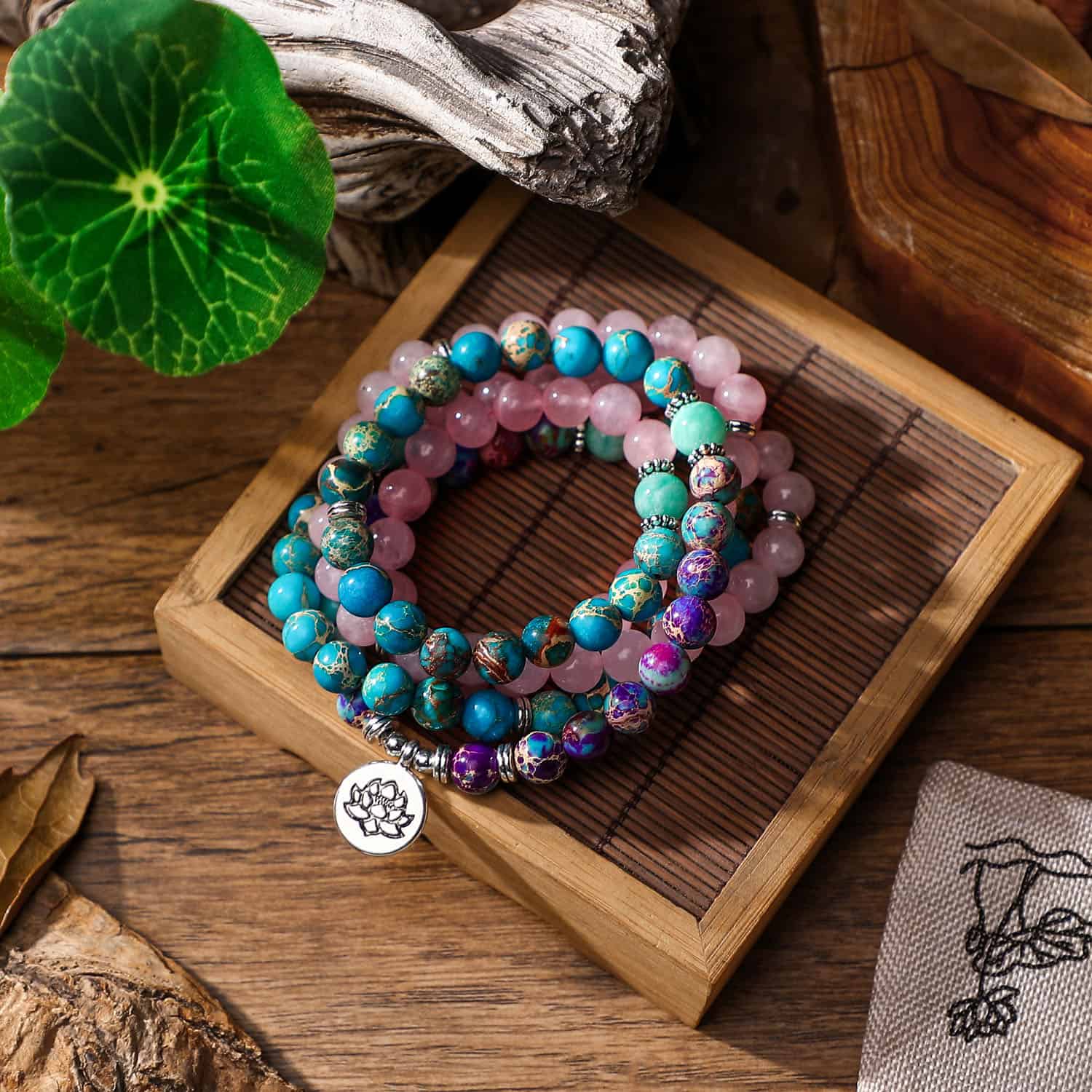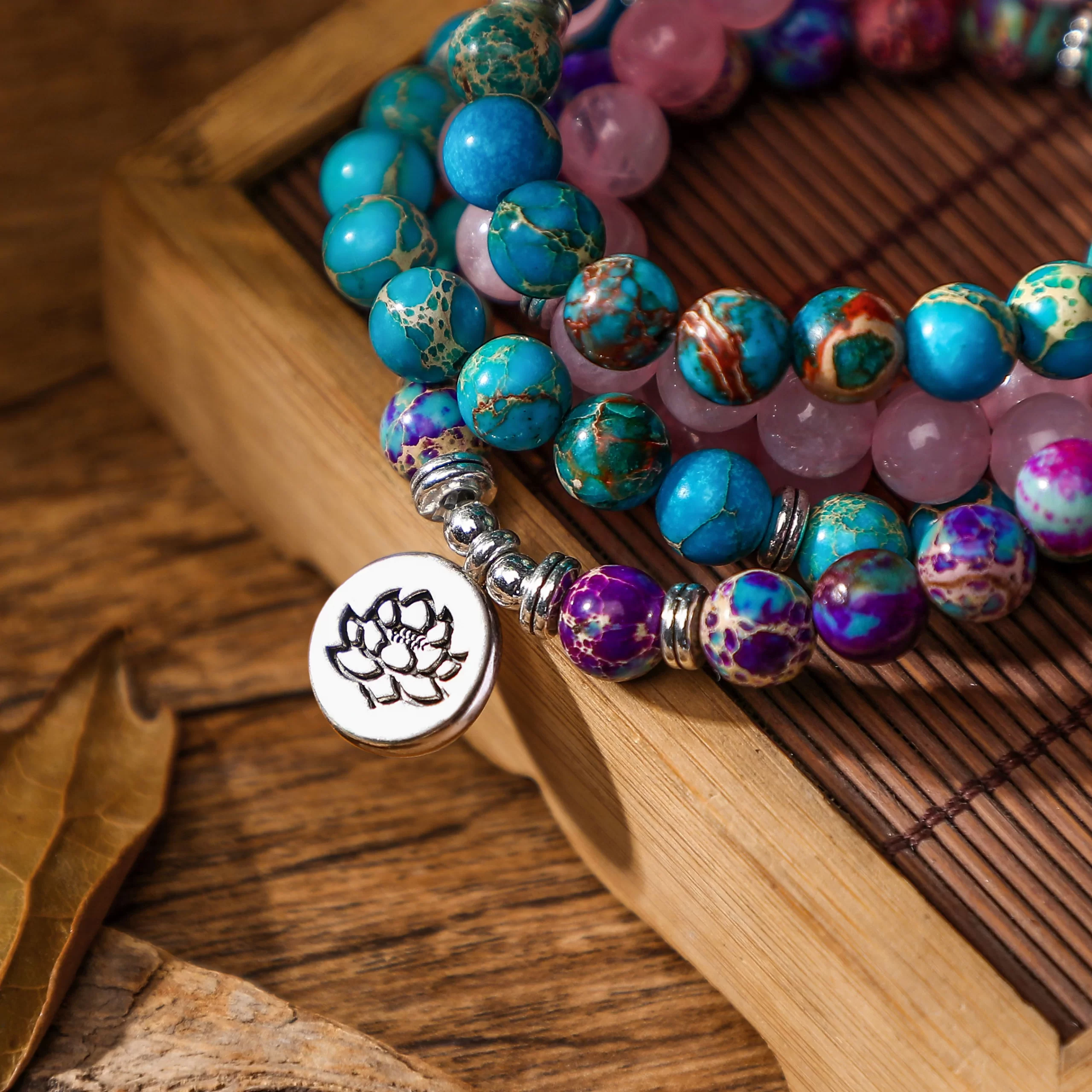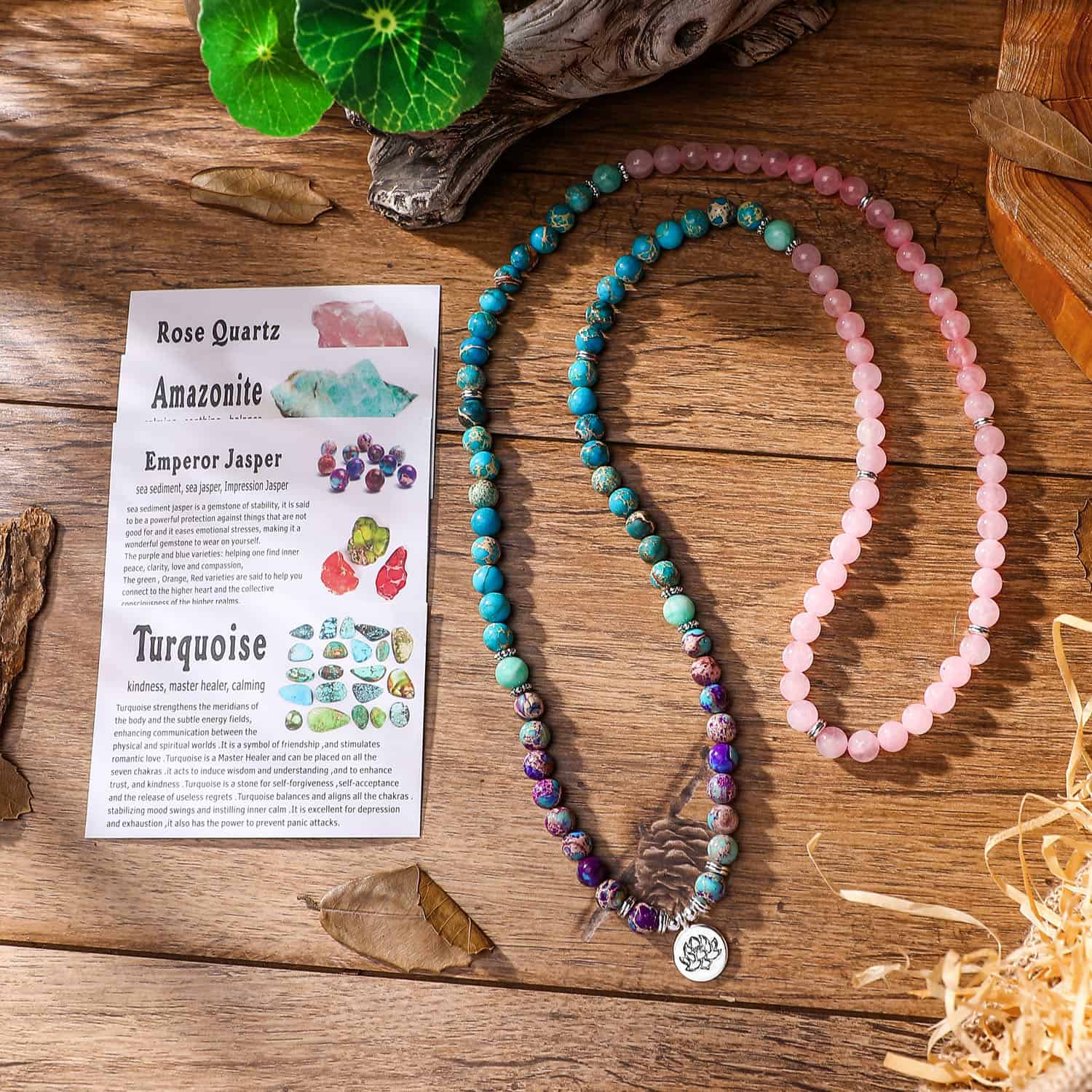Menu
SPECIALIZZATI IN CROMO-BIOENERGETICA
SPECIALIZZATI IN CROMO-BIOENERGETICA
€29.90
Out of stock
Japamala is a garland composed of 108 stones or grains, closed by a larger grain, called Meru or Sumeru.
Their name comes from Sanskrit, where Japa means ”to murmur” and Mala ”garland”: ”the garland used for whispering prayers or mantras”.
The Mantra thus represents a formula that frees the mind, an instrument that frees thought.
Material: Imperial Jasper, Amazonite, Rose Quartz, Turquoise with Lotus Flower symbol
Japamala
“When you travel to a distant place, you pass many milestones along the way. Even if they were not there, you would still reach your destination. But the milestones give you confirmation and show you that you are going in the right direction. When you do japa the pearls are the milestones and the mala is the road. Road and stones are essential to ensure that you reach your psychic destination. Pearls keep the awareness active and keep the psychic system under control.” Swami Sivananda Saraswati
Japamala is a garland consisting of 108 stones or beads, enclosed by a larger bead called Meru or Sumeru. Their name comes from Sanskrit, where Japa means ”murmuring” and Mala ”garland”: ”the garland used for whispering prayers”.
Their origin is very ancient, so much so that Japamalas are present in Buddhist and Hindu religions dating back some 6,000 years, while mantra recitation comes from the Vedic tradition predating Buddha.
The word mantra also derives from Sanskrit and is made up of man, meaning ‘mind, thought, act of thinking, intellect, breath, living soul’ and the syllable tra, meaning ‘liberating, accomplishing, protecting’. The mantra thus represents a formula that liberates the mind, an instrument that liberates thought.
On a practical level, mantras are represented by a series of words that, pronounced repeatedly, correctly and with the right mental intention, have the power to benefit our mind and our life.
On a practical level, the parallel with Christian culture is quickly made: the recitation of the rosary. In a study published on 22 December 2001 in the British Medical Journal (conducted by Luciano Bernardi, associate professor of internal medicine at the University of Pavia, and colleagues at the John Radcliffe Hospital in Oxford and the Santa Maria Nuova Hospital in Florence), it was shown that the effects of reciting mantras during meditation and the Hail Mary during the rosary are comparable: the rhythm of breathing is reduced and regularised by up to six cycles per minute, inducing a beneficial effect on the heart rate as well. Even the scientists involved in this study speculate that the birth and use of mantras and prayers did not only have a spiritual purpose, but were introduced into everyday life as valuable exercises to slow breathing, increase concentration, synchronise the body’s rhythms and induce a state of calm and general well-being.
According to tradition, the Japamala is worn around the neck and/or left wrist. In meditation, it is used in the right hand by passing the beads between the thumb and middle finger while reciting or whispering the chosen mantra for one’s meditation. One should not use the index finger, symbol of the ego, nor the little finger, symbol of inertia and laziness.
With the right hand you move the Japamala clockwise and when you reach the Meru if you want to continue reciting you start again with the last stone, number 108, and go back counterclockwise.The Meru should never be crossed and when you reach it, the mind is invited to return to its full presence and complete awareness. With every single repetition, the action of the fingers sliding the beads helps not to get lost in unconsciousness, in automatism, and the Japamala thus becomes a precious tool for the mind.
What is Japamala?
The Japamala is a necklace used for the repetition of mantras and prayers. It is normally made up of 108 beads, often with the addition of a larger grain, “meru”, which is not counted but signals to the practitioner the end of a repetition. It is used by running the grains clockwise with the thumb and middle finger of the right hand, without touching them with the index finger.
The beads used can be made of wood, stones, seeds or other materials that generate different vibrations. Compound Malas are considered amulets endowed with energetic, mystical and healing properties.
The number of the grains, 108, is not random. There are endless interpretations and considerations as to its meaning and the reason for its recurrence in Yoga. It is a number connected to religion, science, astrology and more.
To cite a few examples, the diameter of the Sun is about 108 times the diameter of the Earth and the distance between the Earth and the Sun is 108 times the diameter of the Sun. The average distance of the Earth from the Moon is also about 108 times the diameter of the latter.
There are 108 Hindu deities, just as 108 is the number of Nadi, the energy channels that converge at the heart chakra.
The oldest language in the world and the one used since the beginning in Yoga, Sanskrit, is composed of 54 letters or sounds that have both a feminine and a masculine aspect. Multiplying 54 by 2 we get the number 108.
Finally, guess the number of elements that make up the Universe? 108 exactly!
How to wear and use Japamala.
According to tradition, the Japamala is worn around the neck and/or left wrist. In meditation one uses it in the right hand by passing the beads between the thumb and the middle finger while reciting or whispering the chosen mantra for one’s meditation. One should not use the index finger, symbol of the ego, nor the little finger, symbol of inertia and laziness.
With the right hand you move the Japamala clockwise and when you reach the Meru if you want to continue reciting you start again with the last stone, number 108, and go back counterclockwise.The Meru should never be crossed and when you reach it, the mind is invited to return to its full presence and complete awareness. With every single repetition, the action of the fingers sliding the beads helps not to get lost in unconsciousness, in automatism, and the Japamala thus becomes a valuable tool for the mind
Material: Imperial Jasper, Amazonite, Pink Quartz, Turquoise with Lotus Flower symbol
Packaged in a sachet
Out of stock
Inserisci la tua migliore email, quella che leggi sempre: all’iscrizione riceverai gratis il nostro e-book sui colori!
info@colours-shop.com
Ordini/spedizioni 353 433 4928
Commerciale 351 915 4133
Via F. Garavaglia 8,
40127 Bologna (Zona Fiera)
lun-ven: 10-19.00
Italia: in 24h a partire da 6,90€
Copyright – © Ailight® Colors for Life srl | P.IVA 03920591207 | Privacy policy
È espressamente vietato riprodurre, distribuire, pubblicare, riutilizzare anche parzialmente i testi e le immagini contenute in questo sito, anche per scopi personali.
Acquista i nostri prodotti con un
5% di sconto esclusivo per te.
Copia e incolla questo codice in carrello:



